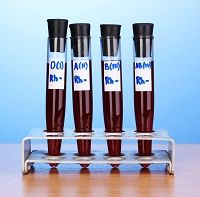Article
Slowing the Progression of Aging with Blood Test
Author(s):
The progression of aging can be tracked – and even slowed – by a blood test that can also possibly detect early warning signs of more serious illnesses.

A blood test can aid people in taking steps to looking and feeling younger, according to a press release for InnerAge, a test developed by InsideTracker.
Professors from MIT developed InsideTracker, which is a blood test designed to make results easier for patients to understand. Beyond that, it details specific actions you can take to improve your health if the results aren’t exactly up to par. In an article for CNN, author David Goldman took the test and it suggested he had low testosterone probably due to lack of sleep, he wasn’t getting enough exercise or doing enough strength training. His doctor hadn’t previously suggested those things — his doctor and the device only agreed on one diagnoses: low vitamin D.
InsideTracker suggested Goldman eat more bran, lima beans, almonds, and artichokes to combat these symptoms. But, the important question Goldman asked InsideTracker founder Gil Blander, PhD was why couldn’t his physician identify those problems while the device could?
Because InsideTracker looks for “measures of health,” Blander said. “We’re not trying to see disease, because there aren’t many lifestyle changes you can make to change it. But we are screening for testosterone, because sleep and diet can improve it.”
For $99, InsideTracker offers a test called InnerAge, which can measure and help individuals understand, manage, and optimize the way their bodies are aging. Blood biomarkers are tested in the device and assess the way nutrition and exercise physiology impact longevity, especially a person’s biological or physiological age compared to their chronological age. InnerAge recommends 5 targeted “Focus Foods” — glucose, vitamin D, testosterone (included in the men’s test), hsCRP, and ALT – which can slow the effects of aging.
By suggesting these “Focus Foods” after an initial blood test, InnerAge purports to give nutritional advice and a guideline to improve wellness goals on the dashboard of the device. The device may reduce 15 years off their actual age and catch early warning signs of more serious illnesses.
“A person’s InnerAge is impacted by the decisions they make every day,” continued Blander in a statement. “We created InnerAge to be an easy to understand platform that helps people make smart decisions based on the most advanced science available. By providing a tangible value — one’s physiological age – we are giving people an immediately understandable benchmark and strong motivational force to modify their behavior to optimize their health, minimize age related disease, and prolong life.”
The test primarily targets people who are already generally healthy, such as fitness buffs and those who have healthy diets. Goldman reported doctors are better suited to treat unhealthy people or patients who are in pain.
“Crucially, to optimize longevity, people need to manage and optimize their body’s glucose, vitamin D, and inflammation levels, as well as improve their liver function,” Blander concluded. “InnerAge will fine tune your body’s performance, much like servicing your car fine tunes your car’s engine. The advice is tailored to your body, and might include guidance like eating avocados, beans, and artichokes to reduce glucose, and eating more salmon, cheese, and mushrooms to increase levels of vitamin D."




